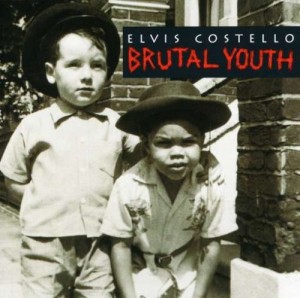
Released In 1994, "Brutal Youth" Has Become A Mandatory Listen For Fans Of Costello Both Old And New
“Brutal Youth” was incontestably Elvis Costello’s best album of the ‘90s. It was no coincidence that it was his first full-scale collaboration with The Attractions since “Blood & Chocolate”, his 1986 record that yielded the deliciously turbulent “I Want You”.
Here, Costello is backed by his classic ensemble on five numbers; Nick Lowe sits in for Bruce Thomas in the remaining seven cuts, and Elvis himself plays bass on “Kinder Murder” and “20% Amnesia”.
The disc (issued in 1994) mostly apes his late ‘70s sound, and cuts like “Pony Street”, “13 Steps Lead Down”, “My Science Fiction Twin” and “20% Amnesia” wouldn’t feel out of place on his early trinity of albums. The emphasis is often placed on the melodic twists he was always revered for in his heyday, while songs like “Rocking Horse Road” recall the more polished MO of later albums like “Get Happy!!”.
The most new-wavish song is “Kinder Murder”, whose main riff actually treads grungier turf – it always made me think of The Posies at their most pissed off (“Everybody Is A Fucking Liar”).
Giving the coin a good flip we find “London’s Brilliant Parade” and “You Tripped At Every Step”. The latter is a piano number that will make you think of “Imperial Bedroom”. The song is yet another take on the vagaries of fame when they collide with commonness (“when beauty meets ignorance they shout on the street”, indeed), and it has the most noticeable build-up of the whole disc (“Pony Street” comes damn close, too).
For its part, “Clown Strike” is nothing but a rewrite of “Clowntime Is Over” (“Get Happy!!“), only that the tone has shifted from imminent violence to vengeful sarcasm, as if the new character became aware that words can have a more damaging effect than a thousand blows. The vengeful tone is also the common denominator in “Just About Glad”, a song that adds nothing to the cannon established by “I Hope You’re Happy Now”.
Costello sends off the CD single-handedly by performing “Favorite Hour” on piano, and the instrumental toning down effectively announces his forthcoming (and sadly final) album with the Attractions, “All This Useless Beauty” (1996). That was to be a more measured and refined record (Mitchell Froom did not produce it). But for devotees of Elvis’ golden days, it doesn’t get more consanguineous than this – specially if they sat through “The Juliet Letters” in their entirety.
Rating: 8.5/10

Pingback: All This Useless Beauty (Elvis Costello) – Album Review | MusicKO